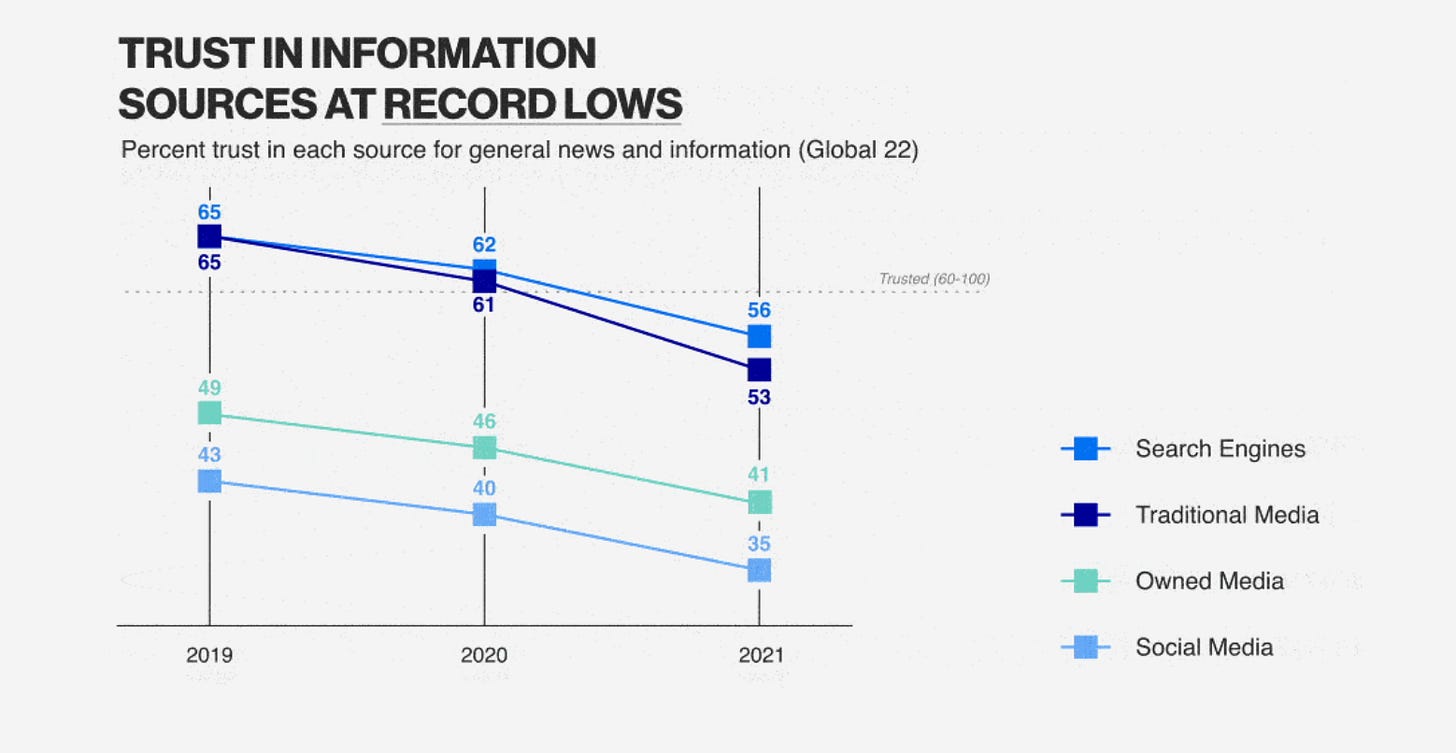Hawaii currently relies on imports for 90% of its food supply, making it heavily dependent on the US mainland.
Before Captain Cook's (British explorer) arrival, native Hawaiians were able to produce more food using less land, adequately sustaining their entire population.
A recent study found that the indigenous ahupua'a system used just 6% of Hawaii's land area, but produced enough food for 1.2 million pre-contact Native Hawaiians (about 86% of Hawaii's present population).
Modern Hawaii uses three times that much land for agriculture but produces a mere 15% of what Native Hawaiians achieved over two centuries ago without any external inputs.
For more insights on this topic, explore the thread by an expert in regenerative agriculture, Sam Knowlton (and follow him):
https://twitter.com/samdknowlton/status/1615742176151113730?s=20
The takeaway for us is that, no “advancements” in modern agricultural practices can compete with, a deep understanding and connection with the land.
If you take the understanding of the landscape and combine that with the leverage of modern agriculture in the right places, you get exponential results.
This issue does not seem to be unique to agriculture.
Let’s use this as an analogy for the internet – and our preoccupation with fears about AI.
Promises of the internet
The advent of the search engine triggered the biggest shift in human consciousness since the invention of writing. Suddenly, we could easily find endless information about anything we could possibly conceive of, delivered from the combined library of all of human thought.
This powers everything from open-sourcing the human genome to the ability to Google “Italian restaurants near me” and then text the highest-rated one to my friend and say, “I hear this place is pretty good.”
You can hear the excitement in the “Declaration of the Independence of Cyberspace,” written in 1996: "We are creating a world where anyone, anywhere may express his or her beliefs, no matter how singular, without fear of being coerced into silence or conformity."
So, we better get this straight or face the consequences: Why didn’t the internet create this highly optimistic outcome? In small ways, it did. The internet didn't work out well for a lot of people, but it worked out really well for people who were awake.
It might seem strange to reflect on this. You may even feel that things were better back in the 90s than they are today. Simpler, maybe. With the power we have, shouldn’t things be much better across the board?
As we’re formulating these existential questions, AI enters the chat.
AI has the potential to revolutionize, yet again, the way we access and process information. AI algorithms pull from the entire span of the internet to find an answer to the questions we seek.
For example, it helped me find the “Declaration of the Independence of Cyberspace” (This was part of a longer conversation).
AI can understand subtlety and parse context. Suddenly, the way my brother tries to use Google will actually work: “Hey, Google, what’s that song by that woman I like from that movie we watched last night where she sings all high?”
And unlike Google (which requires someone to have already written an answer to your question), AI can formulate disparate pieces of information to craft the answer you seek. You can ask for evidence for an argument you’re exploring, and AI can synthesize it for you.
Current AI allows you to learn with a virtual Socrates that you can ping-pong questions with and dive deep into any topic of your curiosity. You just have to bring curiosity.
To give an idea:
"Artificial intelligence has the potential to revolutionize the way we access and process information. By connecting the dots between various data sources, AI can help us create a more comprehensive understanding of the world." - Pedro Domingos, Professor of Computer Science at the University of Washington.
The implications are staggering. Books and theses that once took years to research can be crafted in a fraction of the time by dialoguing with AI. You don’t have to spend hours (or years) scouring the internet. A robot can do it for you in seconds.
"Machine learning has the potential to accelerate scientific discovery and innovation by analyzing vast amounts of data and uncovering patterns that humans might not see." - Demis Hassabis, Co-founder and CEO of DeepMind.
How can we use that information to help make sure the AI revolution makes our kids' lives better?
The internet bit at the ankles of centralized power
Once, the most obvious value of universities was near-exclusive access to all the books and professors.
Now, of course, the internet distributes what was effectively informational gold for free, with infinite replicability. Even the professors are able to record their lectures and release them for free on YouTube, where they can be accessed infinitely, like an army of androids, 24/7.
What value the universities have left, we covered in a different post. Basically, they hold value by making their degrees scarce and elite. A degree is also a rough (and getting rougher) shorthand for the ability to do hard things for an extended period of time, which is hypothetically valuable to an employer.
Meanwhile, universities scrambling for students have increased their tuition, sealing their fate. The eventual collapse of universities feels inevitable. Harvard Business professor Clayton Christensen predicted that as many as half of all U.S. universities could go bankrupt within the next 15 years thanks to online education and other disruptive innovations. AI only accelerates academia’s downward spiral.
And universities are not the only institutions feeling the strain.
In recent decades people have lost trust in the government, the media, and pretty much any structure larger than themselves. The 2021 Edelman Trust Barometer showed that trust in all four key institutions – government, business, non-governmental organizations, and media – reached an all-time low, with the majority of respondents reporting that these institutions were failing them.
It’s all largely for the same reason: in the age of the internet, we can tell when we’re being lied to.
Yet power has been centralized, and control consolidated further since the 90s. But there are silver linings.
Although more people are being manipulated, access to information is not illegal. You can click these links, for example, and the government won’t knock on your door (probably).
The “truth” these days is hidden behind a wall of spectacle as the legacy media slowly dies.
At least, we can be sure that there will be a growing option for a decentralized and free future, even if the majority of people don’t take it. People have some intuition, even if they aren’t putting words to it, that centralized structures are not going to save them in the end. This is felt everywhere, from the rise of school choice to the return to regenerative agriculture.
We seem to be experiencing a collective longing to go back to the homestead and plant the roots that will sustain us, where the education system, national media, and the government all failed.
Of course, the centralized media structures are going to do their best to make this seem like a fringe position. But it’s likely more people than you assume – especially if you habitually watch the news.
Sure, a lot of people feel dependent and trapped, but a vocal and passionate minority — that includes us — are exercising the option to be freer than anyone else in human history.
A suspicious lack of utopia
Why didn't access to all of the human knowledge in magic rectangles in each of our pockets end every evil and solve all our problems?
School could now be an hour of gamified learning a day followed by the freedom to play and explore (and research suggests it should be). So why are we still doing it the same old way?
Your child can be tutored 1-on-1 by a combination of the greatest minds in human history. She can learn to code from a virtual Steve Jobs, who knows exactly how much she knows and how to make her better. Or learn from Warren Buffet like he's an old family friend whose only mission is to make your daughter the next great investor. She could even learn storytelling from Homer himself.
Already, you can use ChatGPT as a tutor, and it will gather context within each chat thread, but even-greater education APIs (perfectly prompted to teach algebra to teenagers, for example), are no doubt being frantically developed.
Similar to people in 1996, we might assume, "Well, obviously, this is going to usher in utopia. Humans will clearly use this tool to better themselves to great heights and solve all the world's problems!" But we know better than to jump to that conclusion. We have an intuition that something equally bad is about to enter our lives.
History, and human psychology, suggest hedonism and outrage are going to be the reasons this doesn't make us all into Nietzsche's Ubermensch.
Hyper distractions
The internet is dangerously effective at confusing and addicting us with endless distractions.
AI is taking those vices to a new level. It creates realistic-looking false images to create confusion, outrage, and political division. For example, I just typed “Joe Biden and Desantis picking flowers together” into MidJourney, and this came out in less than two minutes:
It’s not perfect, but it’s getting there – fast.
“Deep fakes” will call reality into question, making it impossible to trust your own eyes.
AI will offer us entertainment perfectly tailored to our interests and produced on the fly.
Political bias is already programmed into AI. It's easy to get it to say something spookily Orwellian, depending on your outlook.
AI is going to force us to learn that there is no such thing as an "objective" perspective.
Dangerous bias
In order to form a coherent thought, you have to have some point of view. The cognitive science term is “relevance realization,” if you want to learn more.
No matter how intelligent it becomes, AI will make choices in how it "frames" raw data. AI systems inherit the biases of their creators (in this case, liberals working in Silicon Valley) and the data they are trained on.
That fact alone is not a cause for worry. Perspective is necessary. Perspective is what makes a thought interesting as opposed to generic. What is cause for worry is if we start automatically trusting AI as if it were objective. We can't let machines take over our ability to think.
Instant gratification
This is the brilliant observation Huxley made in A Brave New World, which distinguished it from dark, gritty 1984. Huxley realized that people would only allow themselves to be controlled if they were getting some pleasure from it.
What holds most of us back from our potential isn’t fear or control — it is the allure of pleasure.
People allow their smartphones and their TVs to run their lives and record their every action, not because Big Brother forced them to, but because it’s easy and convenient, and they enjoy the funny videos and outrage bait.
If we want better for our kids, we need to teach them to be “whole” so they have a defense against the current and incoming onslaught of instant gratification. The most powerful people on earth might be the people who are raised away from powerful technology like AI, learn to develop their own perspective and self-control, and then are introduced to AI tools later in life when they are ready to leverage them to do something incredible.
How do we temper the influence of AI, so that it does us more good than harm?
Embodiment and play
The antidote to extreme distraction and confirmation bias, the technical solution to the looming threat of AI, is play.
This is deep: all mammals play. Kids play, most obviously, but so do adults. And that’s the way our brain evolved to learn most efficiently. When you’re having a great conversation with a smart friend, learning to code for the first time, or reading a great book, the “play” circuitry is lit up.
If it’s not, you’re not learning very much. We all know what it’s like to read a book we don’t care about – and how little we retain of it.
In a playful mood, we have much more intellectual grit and a willingness to explore what we wish weren’t true. That is one of the functions of play. It allows you to enjoy self-development.
"Play fosters creativity, flexibility, and the development of problem-solving skills, which can contribute to a more resilient and adaptable mindset." - Dr. Peter Gray, research professor of psychology at Boston College.
The school system stamps out play, to train people to be like factory machines — but now we make machines to replace that sort of thinking. Play is what we do that machines can’t.
We must resist the temptation to replace honest play, the work of childhood, with distraction and pleasure, inviting machines to control our behavior. In the farming analogy, the temptation is an overreliance on cheap imports from the mainland.
What to do
Sir Ken Robinson, a British author and education expert, said, "We have to recognize that human flourishing is not a mechanical process; it's an organic process. And you cannot predict the outcome of human development. All you can do, like a farmer, is create the conditions under which they will begin to flourish."
We don’t know exactly what the future holds or what the world will be like after AI. The timeframes are short – we’re talking years, not decades.
Start rebuilding your community now. Do not invest time, attention, and dollars in centralized systems that won’t survive the extreme democratization of information.
The best advice, in this case, is the old advice.
"In times of rapid technological change and uncertainty, it's important to rely on timeless principles such as adaptability, resilience, and critical thinking to navigate the challenges and opportunities that lie ahead." - Yuval Noah Harari
In our opinion, there has never been a more exciting time to be alive.
Raising kids to care about beauty, truth, and goodness, as “old fashioned” as that’s been made to sound, is the best defense against the strange future we now face.
Despite the possibility of AI eliminating our notion of work entirely, it is still a wise investment of time to educate your kids.
It is only a waste of time to educate your kids to be factory workers.
A kid raised with their feet in the dirt — playing outside, developing character, being mentored by their family and community — will be well placed to seize the sky-high potential of AI later in their development. With the incredible tool of machine learning and the benefits of a mind shaped by play, those kids will have a brighter future than we can currently imagine.
Thanks for reading,
Taylor + rebelEducator team












What about bias in science created by fraudulent papers. Unfortunately the whole premise behind the cause of Alzheimer’s disease is a perfect example. AI would lead the learner off on a wild goose chase. Children and most adults would be all in on biased and fraudulent views of many topics affected by group think! Discernment would be hard to come by.
I appreciate the work you do in these posts very much. I enjoy the ideas/thoughts/discussion they provoke. Thank you